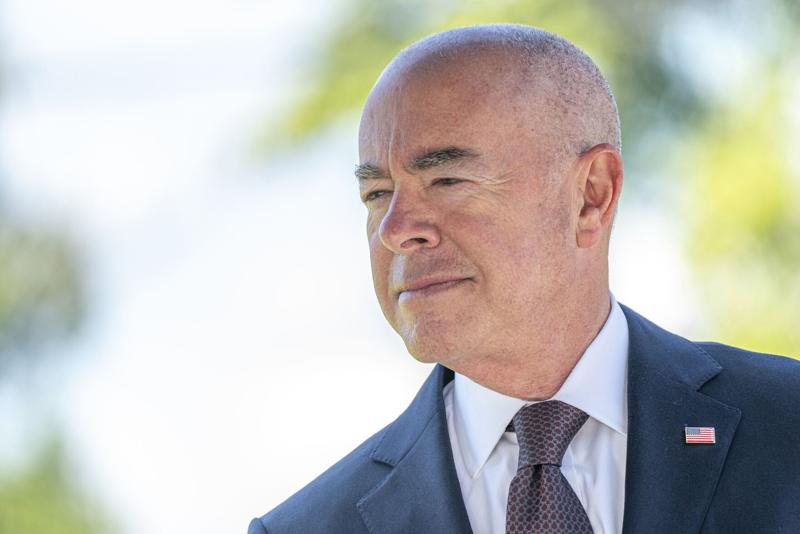(The Center Square) – On the same day a federal judge handed Texas a win in a border wall lawsuit, he also handed 20 Republican-led states a loss in a lawsuit they filed over a parole program created by Department of Homeland Security Secretary Alejandro Mayorkas.
U.S. District Court Judge Drew Tipton of the Southern District of Texas Victoria Division ruled Friday the states lacked standing to bring the case.
The parole program the states sued over is among 12 parole programs House Republicans identified as illegal and used as evidence to support their charge to impeach Mayorkas.
Twenty states, led by Texas, sued over the “illegal visa program” Mayorkas created to allow up to 30,000 Cubans, Haitians, Nicaraguans and Venezuelans to enter the U.S. a month who otherwise would not qualify under current law. Mayorkas’ proposal also required Mexico to hold another roughly 30,000 a month at U.S. taxpayer expense. Overall, Mayorkas’ plan allows 360,000 citizens of Cuba, Haiti, Nicaragua, and Venezuela to be illegally released into the United States, the coalition argues.
The coalition argues Mayorkas’ policy is illegal because Congress only authorized parole “for foreign aliens who meet very specific standards that have not been met in this instance. Yet, contrary to existing law, the program creates a pathway for program participants to apply from their home country and gain lawful status to enter and stay in the U.S. for up to two years, or even longer.”
They argue the parole system can only be applied on a “case-by-case basis for urgent humanitarian reasons or significant public benefit,” not en masse as it’s been used or is being proposed.
Last January, Mayorkas, after again claiming the “the border was closed,” said he expanded the parole program to “provide humanitarian relief consistent with our values, cut out vicious smuggling organizations, and enforce our laws.”
Six months later, he expanded it even more to include four more countries: Colombia, El Salvador, Guatemala, and Honduras. He claimed this program was to reunite families from these countries, although he halted DNA testing to validate if those claiming to be family are actually biologically related.
Since implementing these policies, the greatest number of illegal border crossers of now more than 10 million, including gotaways, were reported entering the U.S., greater than the population of 41 individual states. This includes nearly 4 million illegal border crossers reported in fiscal 2023 alone, more than the population of 22 states. The greatest numbers continued to be reported into the first quarter of fiscal 2024, at both the northern and southwest border, the largest numbers for these months in U.S. history, The Center Square has exclusively reported.
In his 31-page ruling, Tipton said the “court does not address the lawfulness of the program. The court may only reach that question after a plaintiff has established that it has standing.”
Texas could not prove injury or that it spent more money because of the program, the judge argued. He also pointed to a Fifth Circuit ruling requiring the Biden administration to reinstate the Remain in Mexico policy, known as the Migrant Parole Protocols (MPP). The Fifth Circuit ruled that “MPP’s termination has caused an increase in unlawful immigration into Texas,” Tipton noted, pointing to increased parole numbers in Texas, which directly caused harm, according to the ruling.
The Fifth Circuit compared the increase of immigration levels to before and after MPP was terminated, Tipton said, not to zero immigration to arrive at its conclusion.
He also pointed to other Fifth Circuit rulings to make his case that Texas had not proven the state had been injured under Article III of the U.S. Constitution to necessitate standing.
As a result, he ruled, “The Court finds that Plaintiffs have not proven that Texas has suffered an injury and therefore do not have standing to maintain this case is DISMISSED without prejudice. The Court DENIES all requested relief and will enter a final judgment by separate order.”
Paxton has not yet issued a statement on the ruling. Mayorkas praised the ruling in a statement, also saying the parole program he created was “a key element of our efforts to address the unprecedented level of migration throughout our hemisphere.”
To address rulings like this and others, Republican U.S. Reps. Chip Roy of Texas and Dan Bishop of North Carolina introduced a bill last month to give state attorneys general greater authority and legal standing to sue the federal government when it fails to enforce federal immigration law established by Congress.
They did so after the U.S. Supreme Court last July ruled that Texas and Louisiana did not have standing to challenge another Mayorkas policy that effectively ended most deportations of illegal foreign nationals.







